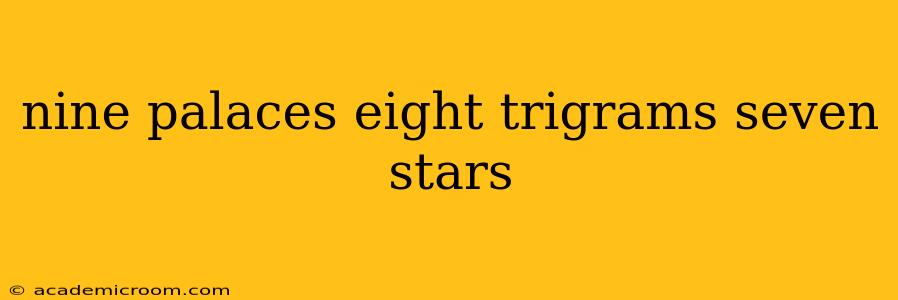The phrase "Nine Palaces, Eight Trigrams, Seven Stars" evokes a world of ancient Chinese divination, a complex system interwoven with cosmology, philosophy, and spirituality. This practice, spanning millennia, offers a fascinating glimpse into the Chinese worldview and its attempts to understand and predict the future. While seemingly disparate elements, these three components – the Nine Palaces, the Eight Trigrams (Bagua), and the Seven Stars – are intricately linked, forming a rich tapestry of predictive arts. This article will delve into each element, explaining their significance and interconnectedness.
What are the Nine Palaces?
The Nine Palaces (九宮, Jiǔ Gōng) refers to a 3x3 grid used in various forms of Chinese divination, including Feng Shui and certain types of fortune-telling. Each palace represents a specific direction, element, and often, a symbolic meaning. The arrangement of numbers within the grid, often derived from the Lo Shu Square, is crucial in determining auspicious or inauspicious influences. The palaces aren't simply static locations; they are dynamic forces interacting with each other, creating a complex energetic landscape. Understanding the relationships between these palaces is key to interpreting their influence on an individual's life or a given space.
What are the Eight Trigrams (Bagua)?
The Eight Trigrams (八卦, Bāguà) are fundamental symbols in Chinese cosmology and divination. Each trigram is composed of three lines, each either solid (yang) or broken (yin), representing the interplay of opposing forces. These eight trigrams – Qian (Heaven), Kun (Earth), Zhen (Thunder), Xun (Wind), Kan (Water), Gen (Mountain), Li (Fire), and Dui (Lake) – represent different aspects of reality and are associated with various characteristics and energies. The combination of these trigrams creates the 64 hexagrams used in the I Ching, providing a sophisticated system for understanding change and interpreting events.
What are the Seven Stars?
The Seven Stars (七星, Qī Xīng) in this context typically refers to a system of celestial divination that incorporates the seven prominent stars in the Big Dipper (Plough) constellation. In Chinese astrology, these stars are linked to specific areas of life and influence individual destinies. Different schools of thought vary in their interpretation, but generally, the stars' positions and their relationships to other celestial bodies are used to predict trends, fortunes, and potential challenges. This system often combines with the Nine Palaces and Eight Trigrams to offer a more holistic astrological reading.
How are the Nine Palaces, Eight Trigrams, and Seven Stars connected?
These three systems, while distinct, are frequently intertwined in traditional Chinese divination. The Eight Trigrams can be mapped onto the Nine Palaces, creating a more complex divination chart. The Seven Stars' positions can then be incorporated, providing celestial influences to the overall interpretation. This integrated approach offers a more nuanced and comprehensive understanding of the forces at play, allowing for a deeper level of prediction and guidance.
What is the significance of using all three systems together?
The combined use of the Nine Palaces, Eight Trigrams, and Seven Stars offers a holistic approach to divination, incorporating earthly, cosmic, and celestial energies. This multi-faceted approach allows practitioners to consider a wider range of influences and provides a more detailed and accurate prediction or interpretation. It acknowledges the interconnectedness of all things, reflecting a core principle of Chinese philosophy.
Are there different interpretations of these systems?
Yes, different schools of thought and practitioners may have slightly varying interpretations of these systems. The specific applications and methodologies may differ, leading to a diversity of approaches within the overall framework. This underscores the rich and evolving nature of these ancient divination practices.
Where can I learn more about these divination systems?
Numerous books and resources explore these systems in detail. Seeking guidance from experienced practitioners can provide a deeper understanding and practical application of this fascinating area of Chinese culture and philosophy. Remember, engaging with these systems requires respectful consideration of their cultural and spiritual significance.
